Dictation
- 格式:ppt
- 大小:1.33 MB
- 文档页数:22
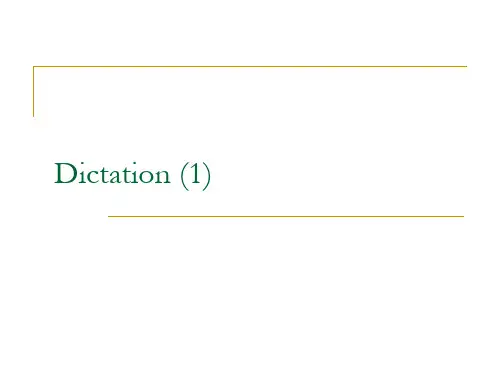

1.Town and Country Life in EnglandThere is a big difference between town life and country life in England. In the country, everybody knows everybody else. They know what time you get up, what time you go to bed and what you have for dinner. If you want help, you will always get it and you will be glad to help others.In a large town like London, however, it can sometimes happen that you have never seen your next door neighbor and you do not know his name or anything about him. People in London are often very lonely. This is because people go to different places in the evenings and at weekends. If you walk through the streets in the centre of London on Sunday, it is like a town without people. One is sorry for old people living on their own. They could die in their homes and would not be discovered for weeks or even months2.A Change in Women’s LifeThe important change in women’s life-pattern has only recently begun to have its full effect on women’s economic position. Even a few years ago most girls left school at the first opportunity, and most of them took a full-time job. However, when they married, they usually left work at once and never returned to it. Today the school-leaving age is sixteen, manygirls stay at school after that age, and though women tend to marry younger, more married women stay at work at least until shortly before their first child is born. Very many more afterwards return to full-time or part-time work. Such changes have led to a new relationship in marriage, with the husband accepting a greater share of the duties and satisfactions of family life and with both husband and wife sharing more equally in providing the money, and running the home, according to the abilities and interests of each of them.Useful Words and Expressions:1. life-pattern生活方式2. share3.A Popular Pastime of the English PeopleOne of the best means of understanding the people of any nation is watching what the do with their non-working time.Most English men, women and children love growing things, especially flowers. Visitors to England in spring, summer or autumn are likely to see gardens all they way along the railway lines. There are flowers at the airports and flowers in factory grounds, as well as in gardens along the roads. Each English town has at least one park with beautifully kept flower beds. Public buildings of every kind have brilliant window boxes andsometimes baskets of flowers are hanging on them.But what the English enjoy most is growing things themselves. If it is impossible to have a garden, then a window box or something growing in a pot will do. Looking at each other’s gardens is a popular pastime with the English.Useful Words and Expressions:1. window box:窗台上的花盆箱2.pastime 消遣,娱乐Swimming is my favorite pastime.4.British and American Police OfficersReal policemen, both in Britain and the U.S., hardly recognize any common points between their lives and what they se on TV—if they ever get home in time.Some things are almost the same, of course, but the policemen do not think much of them much of them.The first difference is that a policeman’s real life deals with the law. Most of what he learns is the law. He has to know actually what actions are against the law and what facts can be used to prove them in court. He has to know nearly as much law as a lawyer, and what’s more, he has to put it into practice on his feet, in the dark and, running down a narrow street after someone hewants to talk to.Little of his time is spent in talking with beautiful girls or in bravely facing cruel criminals. He will spend most of his working life arranging millions of words on thousands of forms about hundreds of sad, ordinary people who are guilty--- or not of stupid, unimportant crimes.Useful Words and Expressions:1. think much of 重视,尊重2. in court 在法庭上3. criminal 罪犯,犯罪者4. guilty 犯罪的,有罪的5.Living SpaceHow much living space does a person need? What happens when his space needs are not met? Scientists are doing experiments on rats to try to determine the effects of overcrowded conditions on man. Recent studies have shown that the behavior of rats is greatly affected by space. If rats have enough living space, they eat well, sleep well and produce their young well. But if their living conditions become too crowded, their behavior and even their health change obviously. They can not sleep and eat well, and signs of fear and worry become clear. The more crowded they are, and more they tend to bite eachother and even kill each other. Thus, for rats, populations and violence are directly related. Is this a natural law for human society as well? Is enough space not only satisfactory, but necessary for human survival? These are interesting questions.6.The United NationsIn 1945, representatives of 50 nations met to plan this organization. It was called the United Nations. After the war, many more nations joined.There are two major parts of the United Nations. One is called the General Assembly. In the General Assembly, every member nation is represented and has an equal vote.The second part is called the Security Council. It has representatives of just 15 nations. Five nations are permanent members: the United States, Russia, France, Britain, and China. The 10 other members are elected every two years by the General Assembly.The major job of the Security Council is to keep peace in the world. If necessary, it can send troops from member nations to try to stop little wars before they turn into big ones.It is hard to get the nations of the Security Council to agree on when this is necessary. But they did vote to try to stop wars.Useful Words and Expressions:1. representative 代表2. General Assembly 联合国大会3. permanent 永久的,持久的4. Security Council 联合国安全理事会7.PlasticWe use plastic wrap to protect our foods. We put our garbage in plastic bags or plastic cans. We sit on plastic chairs, play with plastic toys, drink from plastic cups, and wash our hair with shampoo from plastic bottles!Plastic does not grow in nature. It is made by mixing certain things together. We call it a produced or manufactured material. Plastic was first made in the 1860s from plants, such as wood and cotton. That plastic was soft and burned easily.The first modern plastics were made in the 1930s. Most clear plastic starts out as thick, black oil. That plastic coating inside a pan begins as natural gas.Over the years, hundreds of different plastics have been developed. Some are hard and strong. Some are soft and bendable. Some are clear. Some are many-colored. There is a plastic for almost every need. Scientists continue to experiment with plastics. They hope to find even ways to use them!8. Display of GoodsAre supermarkets designed to persuade us to buy more?Fresh fruit and vegetables are displayed near supermarket entrances. This gives the impression that only healthy food is sold in the shop. Basic foods that everyone buys, like sugar and tea, are not put near each other. They are kept in different aisles so customers are taken past other attractive foods before they find what they want. In this way, shoppers are encouraged to buy products that they do not really need.Sweets are often placed at children’s eye level at the checkout. While parents are waiting to pay, children reach for the sweets and put them in the trolley.More is bought from a fifteen-foot display of one type of product than from a ten-foot one. Customers also buy more when shelves are full than when they are half empty. They do not like to buy from shelves with few products on them because they feel there is something wrong with those products that are there.Useful Words and Expressions:1. aisle 走廊,过道2. trolley 手推车3. checkout 收款台9.Albert EinsteinAlbert Einstein was born in Germany in 1879, His father owned a factory that made electrical devices. His mother enjoyed music and books. His parents were Jewish but they did not observe many of the re ligion’s rules. Albert was a quite child who spent much of his time alone. He was slow to talk and had difficulty learning to read. When Albert was five years old, his father gave him a compass. The child was filled with wonder when he discovered that the compass needle always pointed in the same direction—to be north. He asked his father and his uncle what caused the needle to move. Their answers about magnetism and gravity were difficult for the boy to understand. Yet he spent a lot of time thinking about them. He said later that he felt something hidden had to be behind things.Useful expressions and words:1. device 装置,设备leave to one’s own devices 听任某人自行其是,允许某人按自己的意愿做事She left the child to her own devices for an hour in the afternoon.她允许孩子在下午有一个小时的自由支配时间。
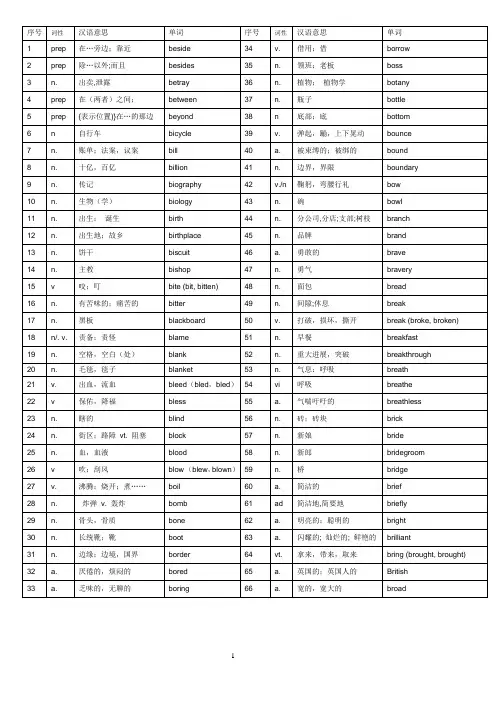
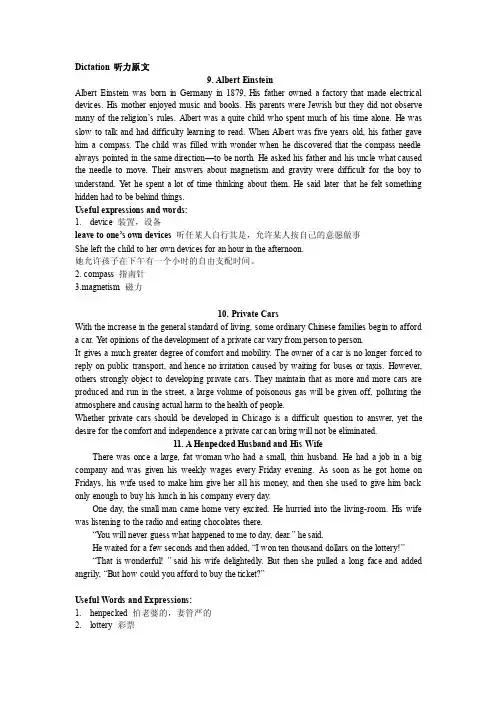
Dictation 听力原文9. Albert EinsteinAlbert Einstein was born in Germany in 1879, His father owned a factory that made electrical devices. His mother enjoyed music and books. His parents were Jewish but they did not observe many of the religion’s rules. Albert was a quite child who spent much of his time alone. He was slow to talk and had difficulty learning to read. When Albert was five years old, his father gave him a compass. The child was filled with wonder when he discovered that the compass needle always pointed in the same direction—to be north. He asked his father and his uncle what caused the needle to move. Their answers about magnetism and gravity were difficult for the boy to understand. Y et he spent a lot of time thinking about them. He said later that he felt something hidden had to be behind things.Useful expressions and words:1.device 装置,设备leave to one’s own devices 听任某人自行其是,允许某人按自己的意愿做事She left the child to her own devices for an hour in the afternoon.她允许孩子在下午有一个小时的自由支配时间。

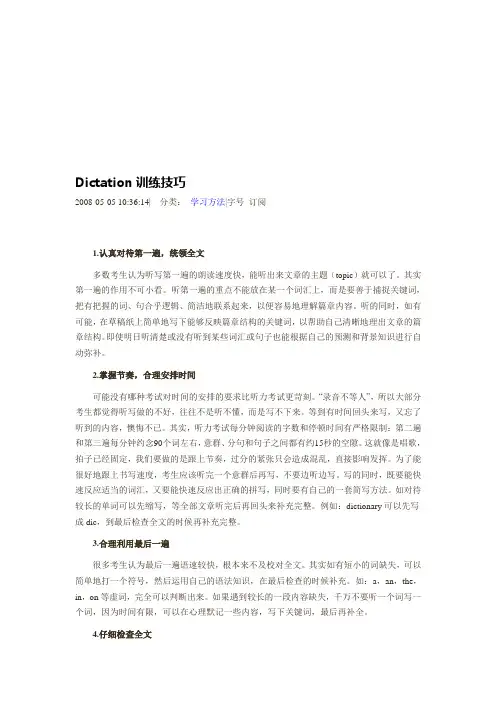
Dictation训练技巧2008-05-05 10:36:14| 分类:学习方法|字号订阅1.认真对待第一遍,统领全文多数考生认为听写第一遍的朗读速度快,能听出来文章的主题(topic)就可以了。
其实第一遍的作用不可小看。
听第一遍的重点不能放在某一个词汇上,而是要善于捕捉关键词,把有把握的词、句合乎逻辑、简洁地联系起来,以便容易地理解篇章内容。
听的同时,如有可能,在草稿纸上简单地写下能够反映篇章结构的关键词,以帮助自己清晰地理出文章的篇章结构。
即使明日听清楚或没有听到某些词汇或句子也能根据自己的预测和背景知识进行自动弥补。
2.掌握节奏,合理安排时间可能没有哪种考试对时间的安排的要求比听力考试更苛刻。
“录音不等人”,所以大部分考生都觉得听写做的不好,往往不是听不懂,而是写不下来。
等到有时间回头来写,又忘了听到的内容,懊悔不已。
其实,听力考试每分钟阅读的字数和停顿时间有严格限制:第二遍和第三遍每分钟约念90个词左右,意群、分句和句子之间都有约15秒的空隙。
这就像是唱歌,拍子已经固定,我们要做的是跟上节奏,过分的紧张只会造成混乱,直接影响发挥。
为了能很好地跟上书写速度,考生应该听完一个意群后再写,不要边听边写。
写的同时,既要能快速反应适当的词汇,又要能快速反应出正确的拼写,同时要有自己的一套简写方法。
如对待较长的单词可以先缩写,等全部文章听完后再回头来补充完整。
例如:dictionary可以先写成dic,到最后检查全文的时候再补充完整。
3.合理利用最后一遍很多考生认为最后一遍语速较快,根本来不及校对全文。
其实如有短小的词缺失,可以简单地打一个符号,然后运用自己的语法知识,在最后检查的时候补充。
如:a,an,the,in,on等虚词,完全可以判断出来。
如果遇到较长的一段内容缺失,千万不要听一个词写一个词,因为时间有限,可以在心理默记一些内容,写下关键词,最后再补全。
4.仔细检查全文通过平时训练,发现许多同学不仔细检查所听写内容,认为录音已经放完,听不出来的内容已经没有办法补救了。
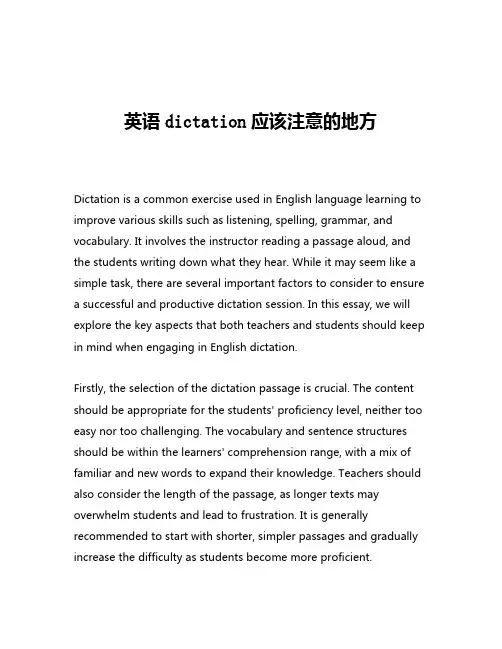
英语dictation应该注意的地方Dictation is a common exercise used in English language learning to improve various skills such as listening, spelling, grammar, and vocabulary. It involves the instructor reading a passage aloud, and the students writing down what they hear. While it may seem like a simple task, there are several important factors to consider to ensure a successful and productive dictation session. In this essay, we will explore the key aspects that both teachers and students should keep in mind when engaging in English dictation.Firstly, the selection of the dictation passage is crucial. The content should be appropriate for the students' proficiency level, neither too easy nor too challenging. The vocabulary and sentence structures should be within the learners' comprehension range, with a mix of familiar and new words to expand their knowledge. Teachers should also consider the length of the passage, as longer texts may overwhelm students and lead to frustration. It is generally recommended to start with shorter, simpler passages and gradually increase the difficulty as students become more proficient.Secondly, the delivery of the dictation is of utmost importance. The instructor's pace should be clear, consistent, and not too rapid, allowing students to process the information and write it down accurately. Pauses between sentences or phrases can help students organize their thoughts and ensure they capture the complete meaning. Additionally, the instructor should avoid excessive repetition, as it may distract students and interfere with their focus. Instead, they should read the passage through once, and then repeat it at a slightly slower pace, if necessary.Another crucial factor is the environment in which the dictation takes place. The classroom should be free from distractions and noise, providing a quiet and conducive setting for students to concentrate. Seating arrangements should be organized in a way that minimizes the potential for cheating or copying, such as ensuring adequate spacing between desks. The lighting and temperature should also be comfortable, as these factors can impact the students' ability to focus and write effectively.Furthermore, the assessment and feedback process in dictation exercises is crucial. Teachers should carefully review the students' work, providing constructive feedback on their spelling, grammar, and overall comprehension of the passage. This feedback should be specific and actionable, highlighting areas for improvement and offering guidance on how to address them. Depending on thestudents' level, teachers may also consider allowing them to self-correct or peer-review their work, fostering a sense of ownership and responsibility for their learning.It is also important to recognize the diverse learning styles and needs of students. Some may excel in auditory learning, while others may benefit more from visual or kinesthetic approaches. Teachers should be prepared to accommodate these differences by incorporating various techniques, such as providing visual aids, allowing students to record the dictation, or incorporating movement-based activities. By catering to the individual needs of students, teachers can enhance the effectiveness of the dictation exercise and ensure that all learners can actively participate and succeed.Additionally, the frequency and integration of dictation within the overall language curriculum should be considered. While regular practice is essential for improving skills, it is important to strike a balance and not overload students with too many dictation exercises. Teachers should also explore ways to integrate dictation into other language learning activities, such as reading comprehension, writing exercises, or vocabulary development. This holistic approach can help students see the relevance of dictation and apply the skillsthey've learned in more meaningful and practical contexts.Finally, it is crucial for both teachers and students to approachdictation with a positive and growth-oriented mindset. Mistakes should be viewed as opportunities for learning, and students should be encouraged to take risks and learn from their errors. Teachers can foster this mindset by creating a supportive and non-judgmental classroom environment, where students feel comfortable making mistakes and seeking help when needed. By cultivating a positive and collaborative learning atmosphere, students are more likely to engage actively in the dictation process and make meaningful progress in their English language development.In conclusion, effective English dictation requires a multifaceted approach that considers various factors, from the selection of the passage to the assessment and feedback process. By paying attention to these key aspects, both teachers and students can maximize the benefits of dictation exercises and enhance the overall language learning experience. Ultimately, the goal of English dictation should be to develop well-rounded language skills, foster a love for learning, and empower students to communicate effectively in a global, English-speaking world.。
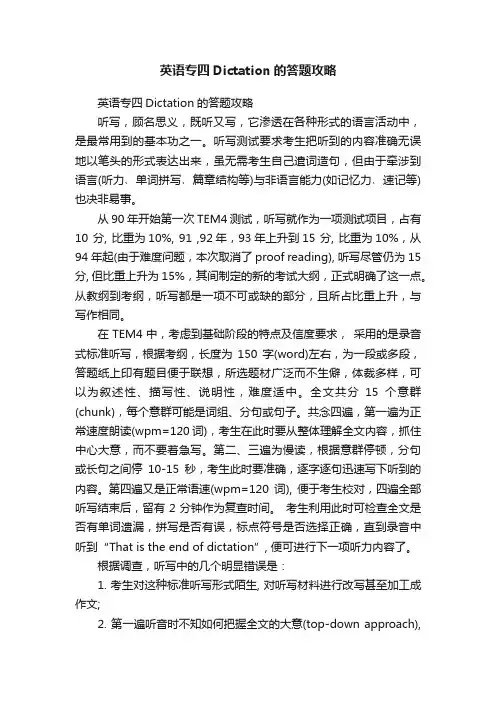
英语专四Dictation的答题攻略英语专四Dictation的答题攻略听写,顾名思义,既听又写,它渗透在各种形式的语言活动中,是最常用到的基本功之一。
听写测试要求考生把听到的内容准确无误地以笔头的形式表达出来,虽无需考生自己遣词造句,但由于牵涉到语言(听力﹑单词拼写﹑篇章结构等)与非语言能力(如记忆力﹑速记等)也决非易事。
从90年开始第一次TEM4测试,听写就作为一项测试项目,占有10 分, 比重为10%, 91 ,92年,93年上升到15 分, 比重为10%,从94年起(由于难度问题,本次取消了 proof reading), 听写尽管仍为15 分, 但比重上升为15%,其间制定的新的考试大纲,正式明确了这一点。
从教纲到考纲,听写都是一项不可或缺的部分,且所占比重上升,与写作相同。
在TEM4中,考虑到基础阶段的特点及信度要求,采用的是录音式标准听写,根据考纲,长度为150字(word)左右,为一段或多段,答题纸上印有题目便于联想,所选题材广泛而不生僻,体裁多样,可以为叙述性、描写性、说明性,难度适中。
全文共分15个意群(chunk),每个意群可能是词组、分句或句子。
共念四遍,第一遍为正常速度朗读(wpm=120词),考生在此时要从整体理解全文内容,抓住中心大意,而不要着急写。
第二、三遍为慢读,根据意群停顿,分句或长句之间停10-15秒,考生此时要准确,逐字逐句迅速写下听到的内容。
第四遍又是正常语速(wpm=120词), 便于考生校对,四遍全部听写结束后,留有2分钟作为复查时间。
考生利用此时可检查全文是否有单词遗漏,拼写是否有误,标点符号是否选择正确,直到录音中听到“That is the end of dictation”, 便可进行下一项听力内容了。
根据调查,听写中的几个明显错误是:1. 考生对这种标准听写形式陌生, 对听写材料进行改写甚至加工成作文;2. 第一遍听音时不知如何把握全文的大意(top-down approach),而是着急写,丢了西瓜捡芝麻(bottom-up),只见部分单词而缺少骨架结构;3. 同样,在第四遍结束后的两分钟复查时间里,不会很好地利用分析逻辑能力对有些明显的或介词搭配或词语进行校正,小错不断,或丢词,或写出的内容前后不通顺;4. 由于朗读中没有念出标点,而是靠学生自己听,判断选择,于是就出现全文没有标点符号,没有大小写,或所有的停顿处都是一种符号,或中文标点混用在英文短文里的情况。


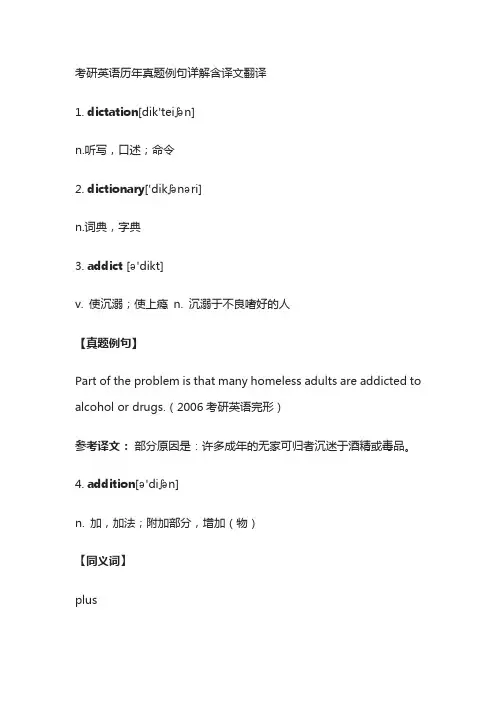
考研英语历年真题例句详解含译文翻译1. dictation[dik'teiʃən]n.听写,口述;命令2. dictionary['dikʃənəri]n.词典,字典3. addict [ə'dikt]v. 使沉溺;使上瘾n. 沉溺于不良嗜好的人【真题例句】Part of the problem is that many homeless adults are addicted to alcohol or drugs.(2006考研英语完形)参考译文:部分原因是:许多成年的无家可归者沉迷于酒精或毒品。
4. addition[ə'diʃən]n. 加,加法;附加部分,增加(物)【同义词】plus【真题例句】Children need to learn addition and subtraction.(201考研英语阅读Text 3)参考译文:小孩需要去学习加法和减法。
5. contradict[,kɔntrə'dikt]v.反驳;同…矛盾,同…抵触[同义词]Deny[真题例句]Three provisions of Arizona's plan were overturned because they contradicted both the federal and state policies.(2013考研英语阅读Text4)参考译文:亚利桑那州计划的三项规定与联邦和州政策相矛盾,因而被否决。
6. contradiction[,kɔntrə'dikʃən]n.反驳,否认;矛盾,不一致[同义词]Discrepancy7. dedicate['dedikeit]vt.奉献;献身于[同义词]devote[真题例句]After all, what is the one modern form of expression almost completely dedicated to depicting happiness?(2006考研英语阅读Test4)参考译文:现代社会最热衷于表达快乐的一种时髦形式到底是什么呢?8. dedication9. indicate ['indikeit]v. 指出,指示;表明,暗示【同义词】manifest【真题例句】The ways of reading indicated here are without doubt kinds of comprehension.(2015新题型)参考译文:这里暗示的阅读方式毫无疑问是理解方式。
四级能不能过关键在听力,阅读.语法部分是要靠长期积累,短时可能没有多大的突破.并且分值也低,而听力和阅读是可以在短时间内提高的.你可以分别去买针对性很强的专项练习来做.听力可以在网上听听VOA的特别英语,或者是去找一套托福考试的听力,这两样一样可以帮助你提高听新闻,另一个帮助你听平时的对话.阅读就必须要坚持.每天坚持做五篇,按照规定的时间来做.做完后把正确率记下来.以便日后对比.在读的过程中不要去查单词,只要把它们划出来,到最后做完题后再来把新单词抄到一个便笺本上,当天解决.当然,第二天还要把昨天记过的单词再看几遍.这种方法既练了阅读,又记住了单词.比你去买一本所谓的四级词汇还管用十几倍.听力Dictation 技巧看起来你的基础比较差,要把基础打好。
听写的很关键的一点是要理解大意,这样有助于记忆每个意群。
不知道你无法理解大意是不是跟词汇量有关,如果看原文还是不大理解就真的应该多背单词了,一般一篇文章的生词数不应超过5个。
建议你多背单词,多做练习,每天都做,比如基英课本上的dictation。
一篇听写可以多次使用,今天做过后明天后天可以继续听,直到全对为止;当然,每天也都要做新的dictation。
有的人建议专四dictation准备初期找150词左右的公四听力材料作为dictation的文章,不过我练起来不是很适应,不知道你适不适合。
平时不论是做什么听力都要试着复述,多加练习,一定会有所提高的。
多写英语,练习连写,提高书写速度。
做dictation时不一定要一次把一个单词写完整,可以先写几个字母,只要自己明白是什么单词就行了,留到第三遍或第四遍还有检查的时候补全。
希望对你有所帮助。
专四Dictation答题攻略从90年开始第一次TEM4测试,听写就作为一项测试项目,占有10 分, 比重为10%, 91 ,92年,93年上升到15 分, 比重为10%,从94年起(由于难度问题,本次取消了 proof reading), 听写尽管仍为15 分, 但比重上升为15%,其间制定的新的考试大纲,正式明确了这一点。
Dictation(听写法)在英语听力教学中的应用[摘要] 随着外语教学法的不断改革创新,英语听力教学方法也经历了历次改革。
听写法(dictation),作为一种听力技巧和考试方法,却一直颇受争议。
与20世纪60年代前的流行地位相反,这种“过时的”教学方法遭到当今推崇交际教学法的外语教师的反对。
争议之处何在?本文结合相关文献和教学实践,在分析听写的法性质、听写存在问题的基础上,提出改进听写方法的一些建议,以期促进英语听力教学。
[关键词] 听写法英语听力教学随着外语教学法的不断改革创新,英语听力教学方法也经历了历次改革。
听写法(dictation)作为一种听力技巧和考试方法,却一直颇受争议。
与20世纪60年代前的流行地位相反,这种“过时的”教学方法遭到当今推崇交际教学法的外语教师的反对。
争议之处何在?本文结合相关文献和教学实践,在分析听写的法性质、听写存在问题的基础上,提出改进听写方法的一些建议,以期促进英语听力教学。
一、听写法(dictation)的性质维基百科全书将听写定义为“口头文本的转录过程,即一方口述,另一方记录。
”然而正是这个看似简单的过程却引起学者们的诸多争论。
著名语言学家Lado批评“听写法似乎没能测试学生的语言能力。
学生可以通过上下文猜词,听写几乎无法测学生的语音知识;听写中特意放慢的速度使学生不太可能听错单词。
”听写似乎没有可取之处,然而事实并非如此。
Oller(1971)用表1描述了听写复杂却意义非凡的全过程。
听写过程综合听者辨别语音语调单位、语法、句法、语音、语义、语用知识和文字输出的能力。
Morris(1983)因此认为听写有助于培养外语学习者精确听写的能力,人们应该重新估量其重要性。
Field(2008)认为听写是一个解码声音信号(decoding)和意义建构(meaning building)的过程。
准确解码声音信号要求听者具备良好的听力和语音知识,意义建构需要听者综合运用语法、句法、语用、语义等语言知识。